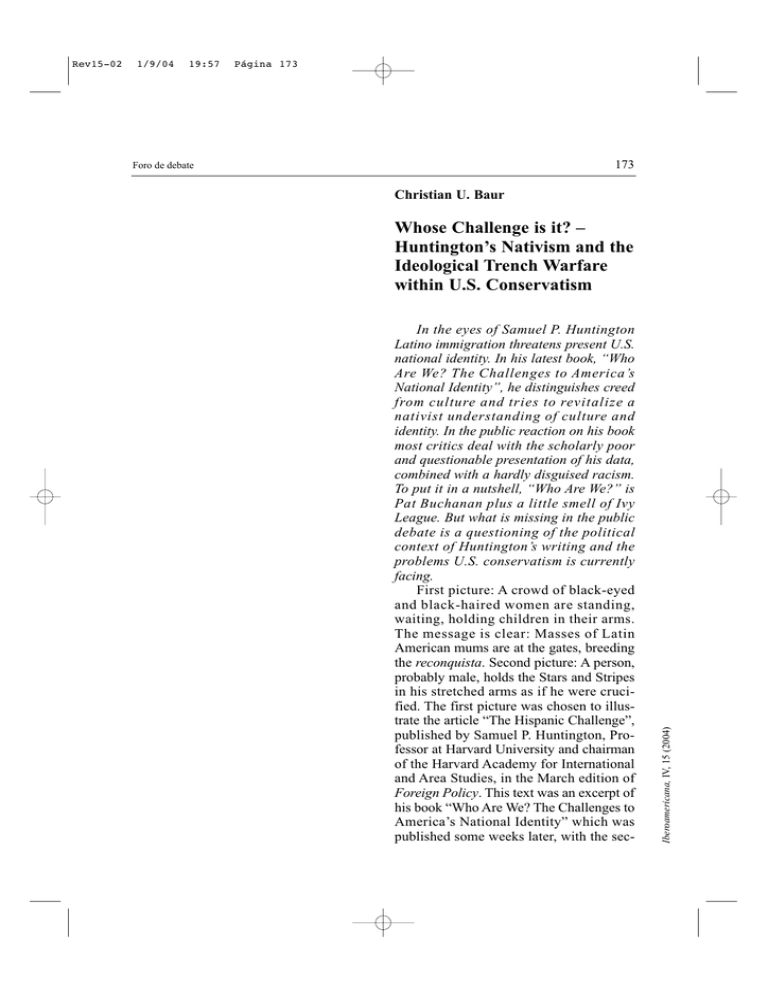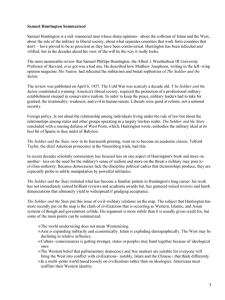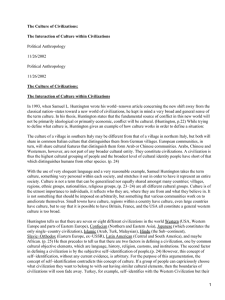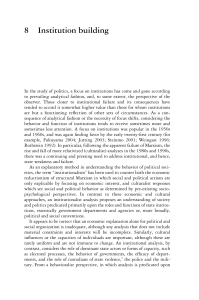Huntington`s Nativism and the Ideological Trench Warfare within US
Anuncio

1/9/04 19:57 Página 173 173 Foro de debate El Gobierno de Aznar había utilizado la nueva cercanía con los Estados Unidos para inducir a la población hispanohablante allí residente, los hispanics, a una mayor identificación con España bajo el lema: “Spain: the friend in Europe”. También aquí se ha de esperar un marcado cambio de rumbo. A la campaña dirigida a los hispanics ya no parece esperarle un gran futuro. La evocación de la hispanidad universal fue, a nivel de la política interna, agudamente criticada por el PSOE, porque tal estrategia de apropiación de los latinoamericanos residentes en los Estados Unidos obstaculizaría un desarrollo próspero de las relaciones con sus naciones de origen. Pero justamente en vista de la afluencia de latinoamericanos emigrantes (de la crisis) hacia España, al nuevo Gobierno le debe interesar que estas relaciones se encuentren libres de gravamen, para que este problema de política interna no se convierta en un campo de conflicto en las relaciones con Iberoamérica. Para el Gobierno de Rodríguez Zapatero podría tornarse difícil, en vista de los mencionados problemas bilaterales en las relaciones con los estados de América Latina, desempeñar el papel que España asume gustosamente en la UE de vocero para la región e intermediario de los intereses latinoamericanos, mientras no haya creado una nueva base estratégica para el diálogo con Argentina, Brasil y México de un lado y con las agrupaciones regionales de otro. Günther Maihold, doctor en Sociología y Ciencias Políticas. Actualmente se desempeña como subdirector del Instituto Alemán para Política Internacional y Seguridad (Stiftung Wissenschaft und Politik – SWP). Correo electrónico: [email protected]. Christian U. Baur Whose Challenge is it? – Huntington’s Nativism and the Ideological Trench Warfare within U.S. Conservatism In the eyes of Samuel P. Huntington Latino immigration threatens present U.S. national identity. In his latest book, “Who Are We? The Challenges to America’s National Identity”, he distinguishes creed from culture and tries to revitalize a nativist understanding of culture and identity. In the public reaction on his book most critics deal with the scholarly poor and questionable presentation of his data, combined with a hardly disguised racism. To put it in a nutshell, “Who Are We?” is Pat Buchanan plus a little smell of Ivy League. But what is missing in the public debate is a questioning of the political context of Huntington’s writing and the problems U.S. conservatism is currently facing. First picture: A crowd of black-eyed and black-haired women are standing, waiting, holding children in their arms. The message is clear: Masses of Latin American mums are at the gates, breeding the reconquista. Second picture: A person, probably male, holds the Stars and Stripes in his stretched arms as if he were crucified. The first picture was chosen to illustrate the article “The Hispanic Challenge”, published by Samuel P. Huntington, Professor at Harvard University and chairman of the Harvard Academy for International and Area Studies, in the March edition of Foreign Policy. This text was an excerpt of his book “Who Are We? The Challenges to America’s National Identity” which was published some weeks later, with the sec- Iberoamericana, IV, 15 (2004) Rev15-02 Rev15-02 1/9/04 19:57 Página 174 Iberoamericana, IV, 15 (2004) 174 ond picture on its cover. These illustrations provide a first indication of the audience Samuel P. Huntington probably wants to address. In addition, they visualize Huntington’s binary understanding of culture: On one side Latin American mothers, who virtually don’t make use of birth control, populating U.S. territory with masses of human beings who “have not assimilated into mainstream U.S. culture, forming instead their own political and linguistic enclaves – from Los Angeles to Miami – and rejecting the Anglo-Protestant values that built the American dream”, as Huntington writes. On the other side the endangered species: the lonesome defender of the Star-Spangled Banner, bearing witness to U.S. patriotism (a self-portrayal of Huntington?). Huntington’s construction of the Latino threat derives from his distinction between creed and culture. While he sees the “American Creed” as a combination of universal core beliefs which are deeply intertwined with “American Identity” (not being shy he of course uses the word ‘American’ when talking about the U.S.), he sees this identity as a the product of ethnic, racial, cultural and political components. While in his eyes the ethnic and racial side have already faded away, “Anglo-Protestant culture” now comes to the fore: “Key elements of that culture include the English language; Christianity; religious commitment; English concepts of the rule of law, (..)” (Foreign Policy, March/April 2004, p. 31 f.). His book has evoked reactions from virtually all political strata in the USA. Conservative groups, from traditionalists and the Christian Right all the way up to right-wing extremists praise his “courage to say the truth”. On the other hand, liberals (the U.S. political classification for left-wing voices) have harshly criticized the book – not to mention the attacks from Foro de debate South of the border by ubiquitous Mexican intellectuals, who call Huntington a masked racist (Carlos Fuentes) or who voice their fear, that Huntington’s book could justify dangerous political action (Enrique Krauze). Nearly all of his critics have shown that his book, from an academic perspective, is weak, working poorly with often questionable data. Huntington mentions the Latino immigrants’ lack of patriotism and their unwillingness to assimilate – but what’s about all the Latino U.S. soldiers serving in Iraq? Catholic immigrants, Huntington presumes, don’t go together well with Anglo-protestant work ethics. But who is working under often cruel conditions in the low-wage sector of the U.S. labour market (conditions under which Huntington, we may safely assume, never had to earn his living)? Gregory Rodriguez (Senior Fellow, New America Foundation) stresses that Huntington’s resentments against Mexicans are an echo of those put forward by U.S. politicians in the mid-19 th century when the United States conquered and annexed the Northern parts of Mexico. However, until today, there is no sign of any Mexican separatist movement in the U.S. South-West. Alan Wolfe points out that “only one of Huntington’s points withstands the test of empirical reality: ordinary Americans are more likely to be patriotic and nationalistic than are liberal elites” (Foreign Affairs, May/June 2004, p. 123). And he summarizes: Insinuating that recent immigrants are unpatriotic and at the same time praising the patriotism of the American ‘masses’ – to which immigrants usually belong–, is contradictory. Thus, the crucial question is: What is Huntington’s nativist line of argumentation aiming at? Answer: Creating enemies by exclusion. Having already claimed in “The Clash of Civilizations”, that asking 1/9/04 19:57 Página 175 Foro de debate “Who are we?” is always connected to the question “Who is not us?”, his new book argues for the explicit need of enemies for national identity building. In this, he is now drawing the line of conflict right across U.S. territory. But it is not only Mexican immigrants, allegedly unwilling to assimilate, threaten what Huntington perceives as “American Identity”. Huntington discovers a second line of conflict, deep in the heart of his own Anglo-Protestant culture: the ‘patriotic public’ versus the ‘dead souls of denationalized elites’. In this attack, Huntington holds the academic establishment, liberal public intellectuals, and corporate America responsible for the spread of multiculturalism, the emergence of a bilingual society and the bifurcation of the nation. He denotes these ‘enemies inside’ as carriers of transnational identities, accusing them to have lost their national roots. The betrayed is, according to Huntington, ‘the patriotic public’ whose anger is rising in the face of job losses due to cheap Mexican labour force or the off-shoring of business. From this he develops the bitter vision of the United States as a country torn apart by increasing ethnic conflicts. For a better understanding of Huntington’s construction of “denationalized dead souls” as the new internal foe, it is useful to consider the actual frictions inside U.S. conservatism. From a non-U.S. point of view, the Republican Party (GOP) under George W. Bush is often seen as being ruled by the so-called Neoconservatives (or short: “Neocons”). Some even assume, that the White House has been taken over by representatives of neoconservative think thanks. This is presumably related to the strong international agenda of the Bush administration and the fact that the Neocons hold expertise in foreign policy. The majority of Neocons emphasize unilateral action as part of an internationalist 175 agenda: globally promoting free trade and market-driven economies as part of their definition of democracy. However, it should not be ignored that this neocon agenda does not represent the opinion of neither the majority of U.S. society nor of the Republican party. The GOP is rather drawing supporters from conservative groups like the Christian Right, the conservative Libertarians, the Paleoconservatives or the Social Conservatives. With the Neocons they all do share a commitment to free market economy and individualism. But the conservative majority inside the GOP tends to have an isolationist stance in line with the all-American foreign policy approach: Live and let live. Among most Republicans, Neocons are accused of promoting international interventions, of accepting high military – which means federal budget – spending, of loosening protective tariffs and of not resisting corporate America’s off-shoring ambitions. Worst of all, the Neocons’ attitude towards Mexican immigration is considered “too soft” by the Republican party’s majority. Meanwhile large parts of Republican supporters perceive the Bush administration as an executor of neocon policies, with Bush, thus, betraying conservative core values. This is why just a few months before the next presidential election mobilization becomes the big issue for conservatives. Because Bushbashing has become common for conservatives as well, the Republican leadership seems no longer able to organize pervasive support for Bush in the upcoming presidential campaign. It is too late, however, for a substantial change of Bush’s policy agenda. Concessions to one part of the Republican clientele leads to losses in other parts: a zero sum game, the conservative way. One of the few options still at hand would be a rearrangement of the Neocons’ Iberoamericana, IV, 15 (2004) Rev15-02 Rev15-02 1/9/04 19:57 Página 176 176 Iberoamericana, IV, 15 (2004) agenda to enhance their acceptance (and that of the Bush administration) within the conservative camp. In this context, Huntington’s ambivalence as an intellectual becomes interesting. On the one hand he is considered to be one of the leading minds behind the neocon movement: In 1989 he founded the John M. Olin Institute for Strategic Studies at Harvard University, promoting neocon foreign policies and allocating pork from conservative foundations like Bradley, Smith Richardson and John M. Olin Foundation. Huntington serves as academic advisor for the American Enterprise Institute, a think tank founded in 1943 to fight New Deal policies. Furthermore he is an important promoter of intellectuals like Francis Fukuyama and Fareed Zakaria. On the other hand, in contrast to intellectuals like Irving Kristol or Robert D. Kaplan, he is not publicly perceived as a Neocon, but as an exponent of a nationalist and culturalist stance in the line of his “Clash of Civilizations”. For this reason, he seems able to bridge the gap between neocon internationalism and the conservative mainstream. With his bashing of supposedly denationalized elites, his rallying cry Foro de debate against Latino immigration and his attacks against corporate off-shoring in favor of U.S. employees’ interests (which became a hot issue in recent talk shows) he fuels conservative mainstream sentiments. In terms of sales, “Who Are We?” seems mildly successful, at best, whereas “The Clash of Civilizations” had been a long-time bestseller. But Huntington’s quest for enemies receives rapturous applause on conservative web sites and a growing number of neocon intellectuals has started to write about the importance of culture and migration for the Republican party’s agenda. This might have been the central goal of Samuel P. Huntington’s “Who Are We?”: To open up new options for the neoconservative discourse in order to reconcile it with the conservative mainstream. Christian U. Baur holds an M.A. in Political Science and North American Studies from Johann Wolfgang Goethe University, Frankfurt/Main, and is currently working on his PhD thesis about Mexican border issues, violence and public spheres at the Institute of Latin American Studies, Free University Berlin. Contact address: [email protected].



